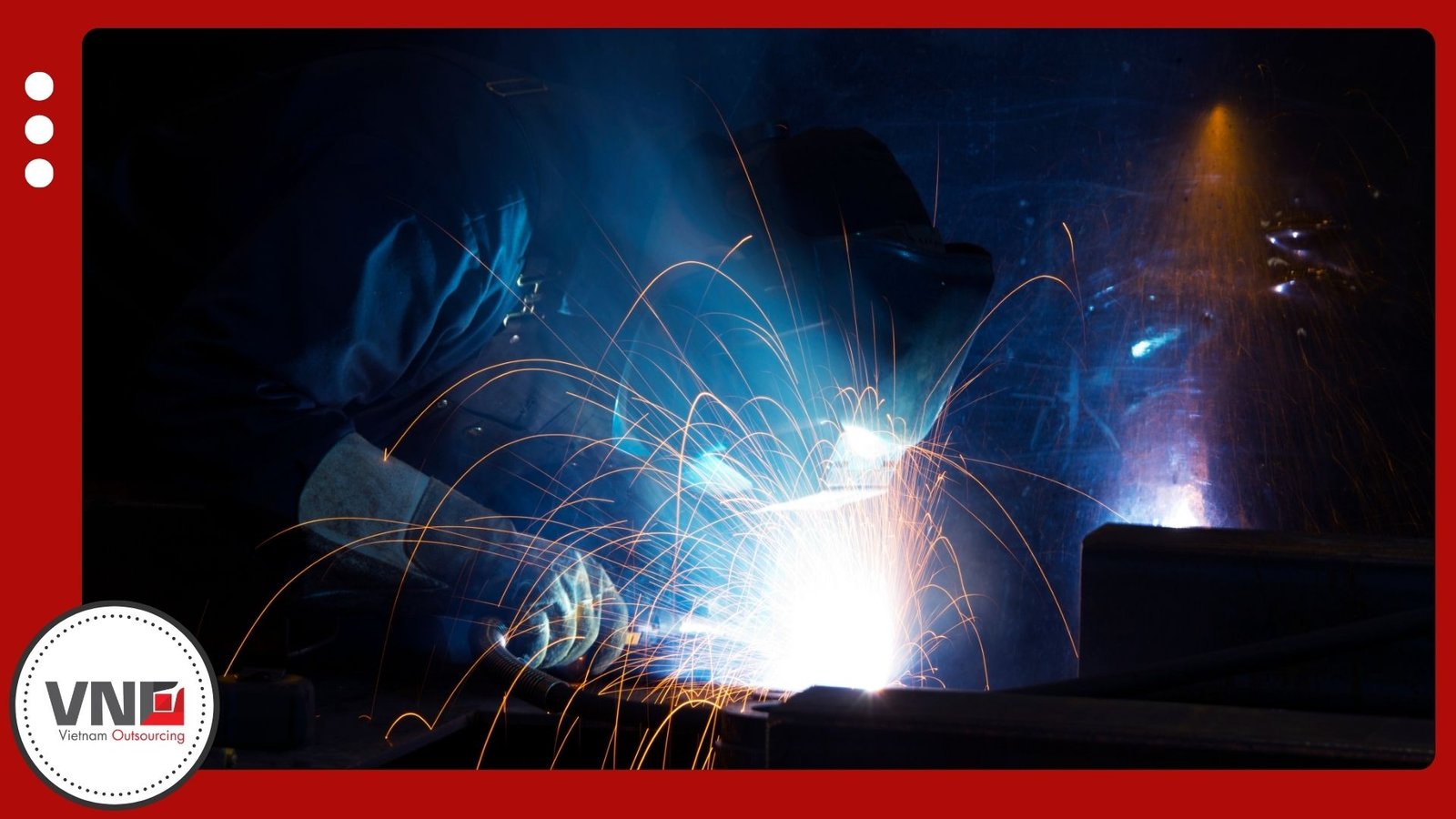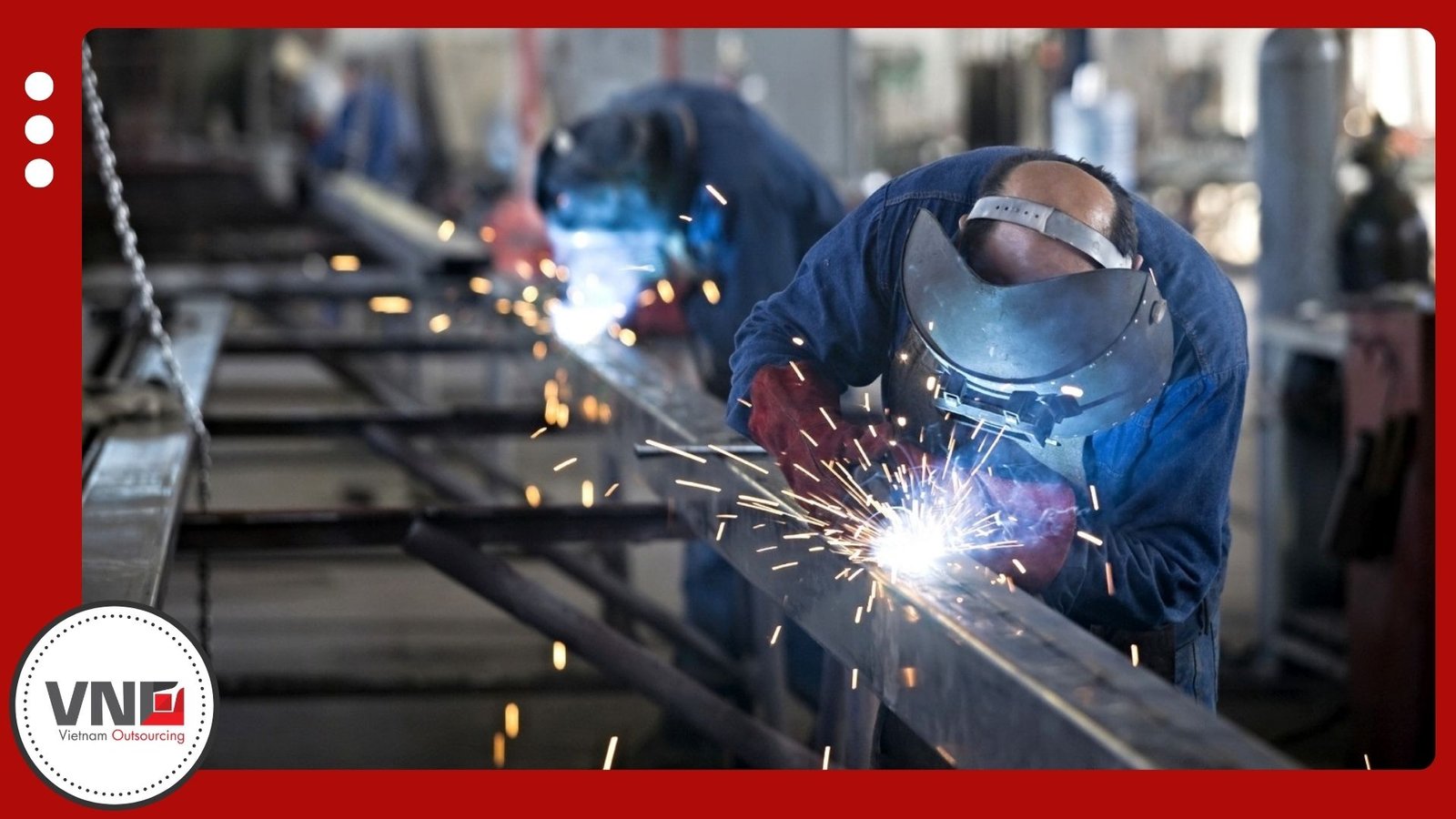Introduction: Vietnam’s Push for Sustainable Metal Manufacturing
As global industries shift toward environmentally friendly production, Vietnam’s metal industry is adapting to meet sustainability standards while remaining a key player in the global supply chain. With rising demand for sustainable metal manufacturing, US and European companies are looking to Vietnam as a cost-effective and eco-conscious outsourcing destination.
In this article, we explore how Vietnam’s metal industry is adopting green practices, what government policies and incentives are driving this transformation, and how businesses can benefit from sustainable metal manufacturing in Vietnam.
Why Sustainable Manufacturing is the Future of Vietnam’s Metal Industry
The Global Shift Toward Green Manufacturing
Sustainable manufacturing is no longer an option—it’s a necessity. Governments and corporations worldwide are setting net-zero carbon goals, prompting suppliers to adopt eco-friendly production methods. The metal industry, known for its energy-intensive processes, is under pressure to reduce carbon emissions, improve material efficiency, and integrate circular economy principles.
According to a 2024 World Economic Forum report:
- 80% of multinational companies now require sustainable sourcing from suppliers.
- The global market for green metals is expected to grow by 12% annually.
- 45% of companies outsourcing metal production prioritize low-carbon supply chains.
Vietnam’s Role in Sustainable Metal Manufacturing
Vietnam is positioning itself as a leading hub for sustainable metal production by:
- Investing in renewable energy sources for industrial use.
- Implementing government incentives to promote green manufacturing.
- Encouraging waste reduction and material recycling in metal processing.
- Partnering with global organizations to meet sustainability standards.
Key Drivers of Sustainable Metal Manufacturing in Vietnam
1. Vietnam’s Government Policies Supporting Green Manufacturing
The Vietnamese government is actively promoting sustainability in the metal industry through various policies and incentives, including:
- National Green Growth Strategy (2021-2030): Aims to reduce carbon emissions by 30% and increase renewable energy use in industrial zones.
- Corporate Tax Incentives: Companies investing in sustainable manufacturing technologies receive tax reductions of up to 50%.
- Preferential Loans for Green Projects: The Vietnamese government and international banks offer low-interest loans for eco-friendly industrial projects.
- Vietnam’s Commitment to Net-Zero by 2050: As pledged at COP26, Vietnam is transitioning to low-carbon manufacturing, benefiting businesses that align with green policies.
2. Adoption of Renewable Energy in Vietnam’s Metal Industry
Vietnam is leading the region in renewable energy adoption, making it a sustainable metal manufacturing hub. Key developments include:
- Solar & Wind Energy Expansion: By 2025, 50% of industrial energy use is expected to come from renewables.
- Government Mandates on Clean Energy: Manufacturers using at least 20% renewable energy qualify for export tax reductions.
- Sustainable Industrial Zones: Vietnam is developing eco-industrial parks where metal processing plants operate on renewable power.
3. Green Metal Processing Technologies in Vietnam
To reduce its environmental impact, Vietnam’s metal industry is integrating sustainable technologies such as:
- Electric Arc Furnaces (EAFs): Reduce carbon emissions by up to 60% compared to traditional blast furnaces.
- Hydroforming & Precision Metal Forming: Minimizes material waste and improves energy efficiency.
- AI & IoT for Energy Optimization: Factories using AI-driven production cut energy use by 15-20%.
- Recycled Metal Production: Vietnamese companies are increasing metal recycling efforts, reducing reliance on raw materials.
How US & EU Companies Benefit from Sustainable Metal Manufacturing in Vietnam
1. Meeting ESG and Compliance Standards
Global companies are under pressure to meet Environmental, Social, and Governance (ESG) requirements. Outsourcing to Vietnam’s sustainable metal industry helps businesses:
- Reduce carbon footprint while maintaining cost efficiency.
- Comply with EU Green Deal and US SEC climate disclosure rules.
- Enhance brand reputation by adopting eco-friendly sourcing.
2. Cost Savings Through Sustainable Manufacturing
Contrary to common belief, sustainable manufacturing lowers long-term costs due to:
- Energy-efficient processes that cut electricity costs.
- Material recycling that reduces raw material expenses.
- Government tax incentives that improve profit margins.
3. Competitive Advantage in Global Markets
Companies sourcing metal from sustainable manufacturers in Vietnam gain a competitive edge by:
- Accessing premium buyers prioritizing green sourcing.
- Qualifying for tariff benefits in trade agreements favoring sustainable production.
- Reducing risk exposure to future environmental regulations.
Challenges & Solutions for Sustainable Metal Manufacturing in Vietnam
Despite its progress, Vietnam’s metal industry faces challenges in sustainability adoption, including:
1. High Initial Investment Costs
- Challenge: Advanced green technologies require significant capital investment.
- Solution: Companies can access government subsidies, green financing, and preferential loans.
2. Need for Skilled Labor in Green Manufacturing
- Challenge: Transitioning to sustainable metal manufacturing requires a skilled workforce.
- Solution: Vietnam’s government is investing in vocational training programs focused on sustainable manufacturing.
3. Supply Chain Disruptions in Raw Material Sourcing
- Challenge: Shortages in recycled and sustainably sourced metals can impact production.
- Solution: Businesses are diversifying supply chains and investing in local metal recycling plants.
More insight can be found at Compliance & Supply Chain in Vietnam.
FAQs About Sustainable Metal Manufacturing in Vietnam
Why is Vietnam becoming a leader in sustainable metal manufacturing?
Vietnam is investing in renewable energy, green manufacturing technologies, and government incentives, making it a top choice for eco-friendly metal outsourcing.
How does sustainable manufacturing reduce costs?
Energy-efficient production, recycling efforts, and tax incentives help businesses lower operational expenses while maintaining high environmental standards.
What industries benefit from sustainable metal manufacturing in Vietnam?
Sectors like automotive, aerospace, construction, and electronics benefit from low-carbon and cost-efficient metal sourcing in Vietnam.
Are there risks in outsourcing metal manufacturing to Vietnam?
While Vietnam offers many benefits, companies should evaluate suppliers carefully, ensure compliance with international standards, and stay updated on trade policies.
How can businesses find sustainable metal suppliers in Vietnam?
Companies can partner with certified manufacturers, conduct audits, and leverage Vietnam’s growing network of eco-friendly industrial zones for supplier selection.
Vietnam is investing in renewable energy, green manufacturing technologies, and government incentives, making it a top choice for eco-friendly metal outsourcing.Energy-efficient production, recycling efforts, and tax incentives help businesses lower operational expenses while maintaining high environmental standards.Sectors like automotive, aerospace, construction, and electronics benefit from low-carbon and cost-efficient metal sourcing in Vietnam.While Vietnam offers many benefits, companies should evaluate suppliers carefully, ensure compliance with international standards, and stay updated on trade policies.Companies can partner with certified manufacturers, conduct audits, and leverage Vietnam’s growing network of eco-friendly industrial zones for supplier selection.
Conclusion: Why Vietnam is the Future of Sustainable Metal Manufacturing
Vietnam’s commitment to green energy, advanced metal manufacturing, and sustainability incentives makes it a leading destination for eco-friendly metal production. US and European companies outsourcing metal manufacturing to Vietnam can benefit from lower costs, ESG compliance, and long-term supply chain sustainability.






